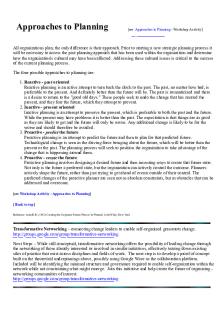4 Approaches to Planning (Reactive, Inactive, Preactive, & Proactive) PDF

| Title | 4 Approaches to Planning (Reactive, Inactive, Preactive, & Proactive) |
|---|---|
| Author | joseph mbugua |
| Course | Bachelor of commerce |
| Institution | Mount Kenya University |
| Pages | 2 |
| File Size | 124.9 KB |
| File Type | |
| Total Downloads | 13 |
| Total Views | 136 |
Summary
approaches of planning...
Description
Approaches to Planning
[see Approaches to Planning - Workshop Activity]
All organizations plan; the only difference is their approach. Prior to starting a new strategic planning process it will be necessary to access the past planning approach that has been used within the organization and determine how the organization's cultural may have been affected. Addressing these cultural issues is critical to the success of the current planning process. The four possible approaches to planning are: 1. Reactive - past oriented Reactive planning is an active attempt to turn back the clock to the past. The past, no matter how bad, is preferable to the present. And definitely better than the future will be. The past is romanticized and there is a desire to return to the "good old days." These people seek to undo the change that has created the present, and they fear the future, which they attempt to prevent. 2. Inactive - present oriented Inactive planning is an attempt to preserve the present, which is preferable to both the past and the future. While the present may have problems it is better than the past. The expectation is that things are as good as they are likely to get and the future will only be worse. Any additional change is likely to be for the worse and should therefore be avoided. 3. Preactive - predict the future Preactive planning is an attempt to predict the future and then to plan for that predicted future. Technological change is seen as the driving force bringing about the future, which will be better than the present or the past. The planning process will seek to position the organization to take advantage of the change that is happening around them. 4. Proactive - create the future Proactive planning involves designing a desired future and then inventing ways to create that future state. Not only is the future a preferred state, but the organization can actively control the outcome. Planners actively shape the future, rather than just trying to get ahead of events outside of their control. The predicted changes of the preactive planner are seen not as absolute constraints, but as obstacles that can be addressed and overcome. [see Workshop Activity - Approaches to Planning]
[ Back to top ] Reference: Ackoff, R. (1981) Creating the Corporate Future: Plan or be Planned. John Wiley, New York.
Transformative Networking – connecting change leaders to enable self-organized grassroots change. http://groups.google.com/group/transformative-networking Next Steps – While still conceptual, transformative networking offers the possibility of leading change through the networking of those already interested or involved in similar initiatives, effectively tearing down existing silos of practice that exist across disciplines and fields of work. The next step is to develop a proof of concept built on the theoretical underpinnings above, possibly using Google Wave as the collaboration platform. Included will be identifying the minimal structure and governance required to enable self-organization within the network while not constraining what might emerge. Join this initiative and help create the future of organizing networking communities of interest. http://groups.google.com/group/transformative-networking
enTarga Home Page
Organizational Change
Strategic Planning HR Planning
Organizational Complexity
Knowledge Management
[ Sitemap & Table of Contents | Contact Us ]
Anyone can link to this site without any further notification. (Thanks for the link.) Questions or problems regarding this web site should be directed to the Webmaster. Privacy Statement Copyright © 2010, enTarga (Ross A. Wirth, Ph. D. - blog ) All rights reserved.
Popular enTarga Phrases: strategic planning process | integrated marketing communication | hr planning | organizational change | stages of learning | customer analysis | steps in planning | planning process Random Phrases: tulsa expungement Last modified: July 19, 2009...
Similar Free PDFs

Approaches to Policing
- 6 Pages

Introduction to Research Approaches
- 32 Pages

Nomothetic Approaches to Personality
- 14 Pages

Approaches to news writing
- 7 Pages

Approaches to course design
- 1 Pages

Approaches to behavior relias
- 5 Pages

Approaches TO Corporate Governance
- 11 Pages

UNIT 2.2 Approaches TO Research
- 1 Pages
Popular Institutions
- Tinajero National High School - Annex
- Politeknik Caltex Riau
- Yokohama City University
- SGT University
- University of Al-Qadisiyah
- Divine Word College of Vigan
- Techniek College Rotterdam
- Universidade de Santiago
- Universiti Teknologi MARA Cawangan Johor Kampus Pasir Gudang
- Poltekkes Kemenkes Yogyakarta
- Baguio City National High School
- Colegio san marcos
- preparatoria uno
- Centro de Bachillerato Tecnológico Industrial y de Servicios No. 107
- Dalian Maritime University
- Quang Trung Secondary School
- Colegio Tecnológico en Informática
- Corporación Regional de Educación Superior
- Grupo CEDVA
- Dar Al Uloom University
- Centro de Estudios Preuniversitarios de la Universidad Nacional de Ingeniería
- 上智大学
- Aakash International School, Nuna Majara
- San Felipe Neri Catholic School
- Kang Chiao International School - New Taipei City
- Misamis Occidental National High School
- Institución Educativa Escuela Normal Juan Ladrilleros
- Kolehiyo ng Pantukan
- Batanes State College
- Instituto Continental
- Sekolah Menengah Kejuruan Kesehatan Kaltara (Tarakan)
- Colegio de La Inmaculada Concepcion - Cebu







